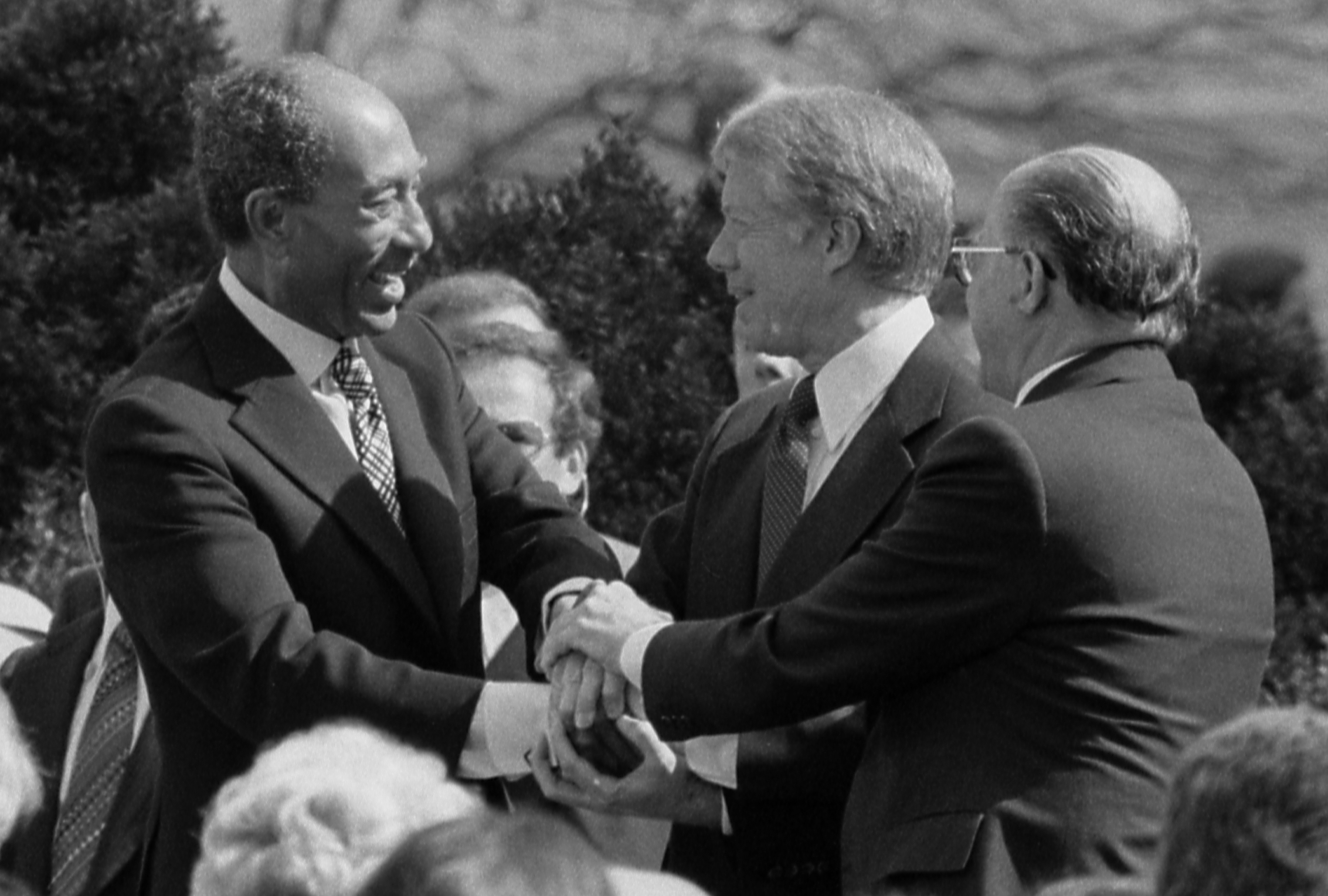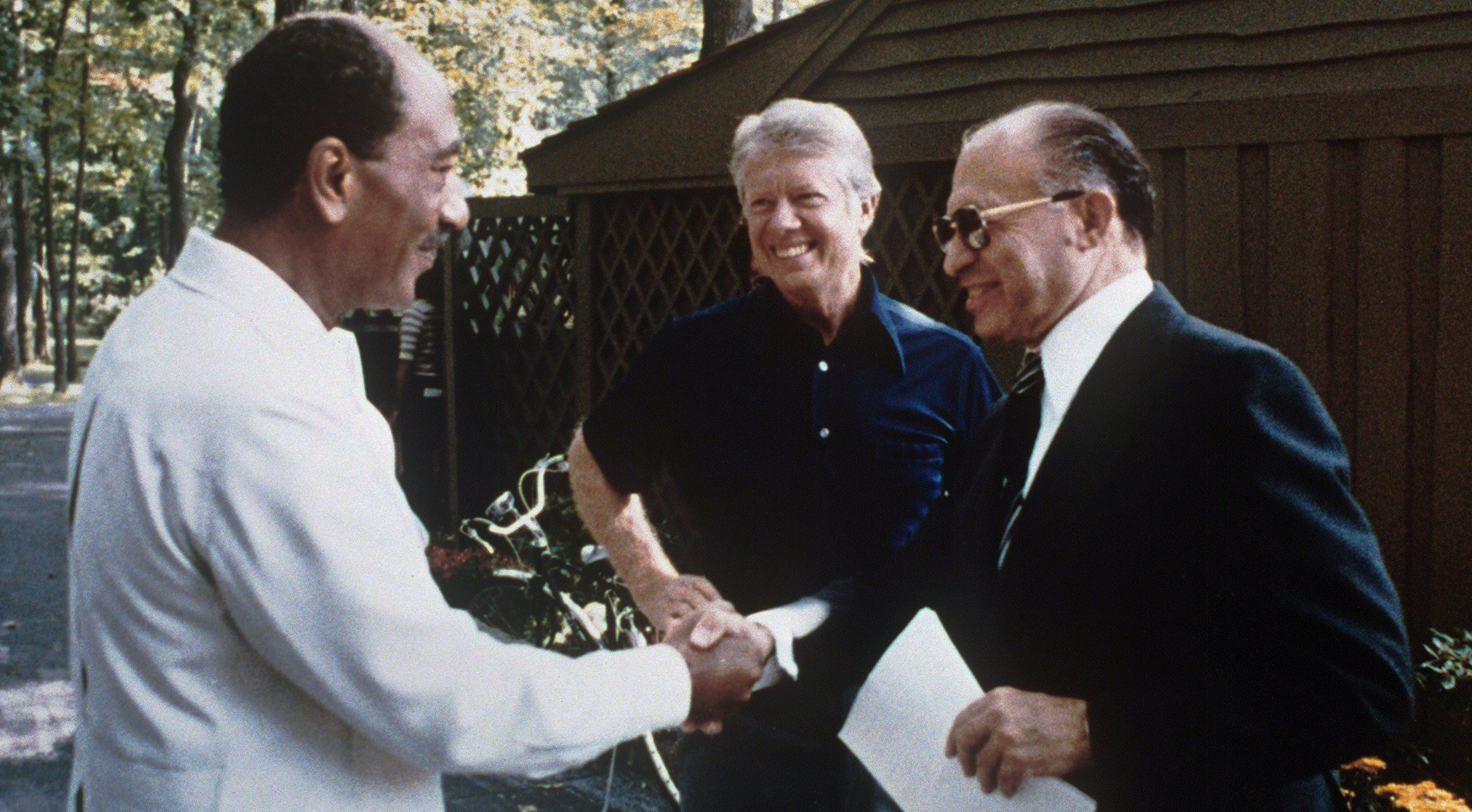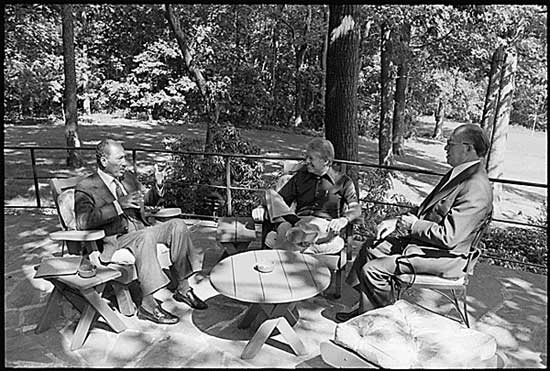Welcome to DU!
The truly grassroots left-of-center political community where regular people, not algorithms, drive the discussions and set the standards.
Join the community:
Create a free account
Support DU (and get rid of ads!):
Become a Star Member
Latest Breaking News
General Discussion
The DU Lounge
All Forums
Issue Forums
Culture Forums
Alliance Forums
Region Forums
Support Forums
Help & Search
General Discussion
Related: Editorials & Other Articles, Issue Forums, Alliance Forums, Region Forums40 Years Ago Today; Sadat, Begin and Carter sign the Egypt-Israel Peace Treaty
Last edited Tue Mar 26, 2019, 04:58 AM - Edit history (1)
https://en.wikipedia.org/wiki/Egypt%E2%80%93Israel_Peace_Treaty

The Egypt–Israel Peace Treaty (Arabic: معاهدة السلام المصرية الإسرائيلية?, Mu`āhadat as-Salām al-Misrīyah al-'Isrā'īlīyah; Hebrew: הסכם השלום בין ישראל למצרים?, Heskem HaShalom Bein Yisrael LeMitzrayim) was signed in Washington, D.C., United States on 26 March 1979, following the 1978 Camp David Accords. The Egypt–Israel treaty was signed by Egyptian president Anwar Sadat and Israeli prime minister Menachem Begin, and witnessed by United States president Jimmy Carter.
History
The peace treaty between Egypt and Israel was signed 16 months after Egyptian president Anwar Sadat's visit to Israel in 1977 after intense negotiation. The main features of the treaty were mutual recognition, cessation of the state of war that had existed since the 1948 Arab–Israeli War, normalization of relations and the complete withdrawal by Israel of its armed forces and civilians from the Sinai Peninsula which Israel had captured during the Six-Day War in 1967. Egypt agreed to leave the area demilitarized. The agreement also provided for the free passage of Israeli ships through the Suez Canal, and recognition of the Strait of Tiran and the Gulf of Aqaba as international waterways.
The agreement notably made Egypt the first Arab state to officially recognize Israel.

<snip>
International reaction
This treaty was received with enormous controversy across the Arab world, where it was condemned and considered a stab in the back. The sense of outrage was particularly strong amongst Palestinians, with the leader of the Palestine Liberation Organization, Yasser Arafat, stating: "Let them sign what they like. False peace will not last". On the other hand, the treaty led both Egyptian president Anwar Sadat and Israeli prime minister Menachem Begin to share the 1978 Nobel Peace Prize for bringing peace between the two states. However, as a result of the treaty, Egypt was suspended from the Arab League in 1979–1989, and Sadat was assassinated on 6 October 1981 by members of the Egyptian Islamic Jihad.
Aftermath
The peace between Egypt and Israel has lasted since the treaty went into effect, and Egypt has become an important strategic partner of Israel. Binyamin Ben-Eliezer, a former Israeli defense minister known for his close ties to Egyptian officials, has stated that "Egypt is not only our closest friend in the region, the co-operation between us goes beyond the strategic."
As part of the agreement, the U.S. began economic and military aid to Egypt, and political backing for its subsequent governments. From the Camp David peace accords in 1978 until 2000, the United States has subsidized Egypt's armed forces with over $38 billion worth of aid. Egypt receives about $1.3 billion annually.
Nevertheless, the peace is often described as a "cold peace", with many in Egypt skeptical about its effectiveness. The Arab-Israeli conflict has kept relations cool. In 2008, the Egyptian army conducted simulated military exercises against an "enemy" Israel.
The Egyptian revolution of 2011 led to fears in Israel about the future of the treaty, although the Israeli prime minister Benjamin Netanyahu stated that he expected any new Egyptian government to keep the peace treaty with Israel, as it has served both countries well. After the Egyptian Army took power on 11 February 2011, it announced that Egypt would continue to abide by all its international and regional treaties. However, Ayman Nour, an influential Egyptian opposition figure and likely presidential candidate called for Cairo's peace treaty with Israel to be "reassessed". On 15 September 2011, the then Egyptian prime minister Essam Sharaf said that "A peace deal with Israel was not sacred". Rashad al-Bayumi, the deputy chief of Egypt's largest party, the Muslim Brotherhood, said that they would not recognize Israel and that the treaty could be put to a referendum, emphasizing that while they respected all of their international agreements, they "had the right to review the peace deal" and that the Egyptian people "have yet to speak their mind". Representatives of the group had told U.S. diplomats that they did not intend to revoke the treaty.
Addressing Israeli concerns on 31 July 2014, Egyptian president Abdel Fattah el-Sisi pledged to continue the peace with Israel. </snip>

The Egypt–Israel Peace Treaty (Arabic: معاهدة السلام المصرية الإسرائيلية?, Mu`āhadat as-Salām al-Misrīyah al-'Isrā'īlīyah; Hebrew: הסכם השלום בין ישראל למצרים?, Heskem HaShalom Bein Yisrael LeMitzrayim) was signed in Washington, D.C., United States on 26 March 1979, following the 1978 Camp David Accords. The Egypt–Israel treaty was signed by Egyptian president Anwar Sadat and Israeli prime minister Menachem Begin, and witnessed by United States president Jimmy Carter.
History
The peace treaty between Egypt and Israel was signed 16 months after Egyptian president Anwar Sadat's visit to Israel in 1977 after intense negotiation. The main features of the treaty were mutual recognition, cessation of the state of war that had existed since the 1948 Arab–Israeli War, normalization of relations and the complete withdrawal by Israel of its armed forces and civilians from the Sinai Peninsula which Israel had captured during the Six-Day War in 1967. Egypt agreed to leave the area demilitarized. The agreement also provided for the free passage of Israeli ships through the Suez Canal, and recognition of the Strait of Tiran and the Gulf of Aqaba as international waterways.
The agreement notably made Egypt the first Arab state to officially recognize Israel.

<snip>
International reaction
This treaty was received with enormous controversy across the Arab world, where it was condemned and considered a stab in the back. The sense of outrage was particularly strong amongst Palestinians, with the leader of the Palestine Liberation Organization, Yasser Arafat, stating: "Let them sign what they like. False peace will not last". On the other hand, the treaty led both Egyptian president Anwar Sadat and Israeli prime minister Menachem Begin to share the 1978 Nobel Peace Prize for bringing peace between the two states. However, as a result of the treaty, Egypt was suspended from the Arab League in 1979–1989, and Sadat was assassinated on 6 October 1981 by members of the Egyptian Islamic Jihad.
Aftermath
The peace between Egypt and Israel has lasted since the treaty went into effect, and Egypt has become an important strategic partner of Israel. Binyamin Ben-Eliezer, a former Israeli defense minister known for his close ties to Egyptian officials, has stated that "Egypt is not only our closest friend in the region, the co-operation between us goes beyond the strategic."
As part of the agreement, the U.S. began economic and military aid to Egypt, and political backing for its subsequent governments. From the Camp David peace accords in 1978 until 2000, the United States has subsidized Egypt's armed forces with over $38 billion worth of aid. Egypt receives about $1.3 billion annually.
Nevertheless, the peace is often described as a "cold peace", with many in Egypt skeptical about its effectiveness. The Arab-Israeli conflict has kept relations cool. In 2008, the Egyptian army conducted simulated military exercises against an "enemy" Israel.
The Egyptian revolution of 2011 led to fears in Israel about the future of the treaty, although the Israeli prime minister Benjamin Netanyahu stated that he expected any new Egyptian government to keep the peace treaty with Israel, as it has served both countries well. After the Egyptian Army took power on 11 February 2011, it announced that Egypt would continue to abide by all its international and regional treaties. However, Ayman Nour, an influential Egyptian opposition figure and likely presidential candidate called for Cairo's peace treaty with Israel to be "reassessed". On 15 September 2011, the then Egyptian prime minister Essam Sharaf said that "A peace deal with Israel was not sacred". Rashad al-Bayumi, the deputy chief of Egypt's largest party, the Muslim Brotherhood, said that they would not recognize Israel and that the treaty could be put to a referendum, emphasizing that while they respected all of their international agreements, they "had the right to review the peace deal" and that the Egyptian people "have yet to speak their mind". Representatives of the group had told U.S. diplomats that they did not intend to revoke the treaty.
Addressing Israeli concerns on 31 July 2014, Egyptian president Abdel Fattah el-Sisi pledged to continue the peace with Israel. </snip>
InfoView thread info, including edit history
TrashPut this thread in your Trash Can (My DU » Trash Can)
BookmarkAdd this thread to your Bookmarks (My DU » Bookmarks)
4 replies, 923 views
ShareGet links to this post and/or share on social media
AlertAlert this post for a rule violation
PowersThere are no powers you can use on this post
EditCannot edit other people's posts
ReplyReply to this post
EditCannot edit other people's posts
Rec (1)
ReplyReply to this post
4 replies
 = new reply since forum marked as read
Highlight:
NoneDon't highlight anything
5 newestHighlight 5 most recent replies
= new reply since forum marked as read
Highlight:
NoneDon't highlight anything
5 newestHighlight 5 most recent replies
40 Years Ago Today; Sadat, Begin and Carter sign the Egypt-Israel Peace Treaty (Original Post)
Dennis Donovan
Mar 2019
OP
dhol82
(9,352 posts)1. Yeah. And look at where we are now.
Sad.
Buckeyeblue
(5,499 posts)2. Anwar Sadat signed the treaty knowing he was signing his own death warrant
He was assassinated in 1981. He was a brave man.
Rhiannon12866
(205,202 posts)3. And it was not easy, but Jimmy Carter sure persisted!
Brokering peace in the Middle East has always been one of his life goals. He came prepared, learned as much as he could about Sadat and Begin, their lives and their goals - and when each of them, separately, prepared to walk away, he used that knowledge to persuade them each to stay. I read the details in Jimmy Carter's autobiography, "A Full Life: Reflections at 90," and it's well worth the read. I got choked up when he told this story. ![]()
![]()
![]()

Dennis Donovan
(18,770 posts)4. I remember when it happened - it was a very big deal!